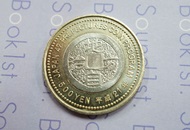The share capital in Japan represents the funding amount which is raised by a business entity through the sale of its shares to public investors.
The share capital is the main equity financing source and it can be raised through the sale of preferred or common stock.
In this article, our company registration consultants in Japan explain what the share capital requirements in Japan are.
Table of Contents
The requirements for share capital in Japan
For business entities in Japan, a shareholder has to invest minimum JPY 1. If such an entity has only one shareholder, the minimum share capital in Japan is JPY 1.
In certain cases, the minimum share capital in Japan is set by different laws, besides the Companies Act. For instance, a business entity usually must have minimum JPY 5 million (USD 44,202) or more for its share capital, in order to be able to apply for an Investor or Business Manager Visa.
The share capital is always declared in JPY, however, it can be acquitted in a foreign currency or as contributions in kind. Our company formation advisors in Japan can offer more details on this matter.
The share capital in Japan in cash has to be deposited in a local bank account if the company is a Kabushiki Kaisha (KK).
But, if it is in the form of a Godo Kaisha (GK, the Japanese LLC), a bank account is not necessary, the share capital being possible to be paid in cash to the company representative office. If you need more details related to this subject, our Japan company formation specialists can help.
Types of share capital in Japan
The share capital is structured in several categories:
• Subscribed share capital: if a business entity prepares to be listed on a stock exchange and issues shares of stock for the first time, its investors are able to file an application where they declare their wish to participate. The subscribed share capital is the monetary value of all the shares in which investors are interested. Our company registration experts in Japan may provide more information related to the subscribed share capital in the country;
• Called-up vs. paid-up share capital: depending on the business structure and the local regulations, business entities can issue shares to investors agreeing that they will acquit them at a later date. Funds due for stock issued but not entirely paid for are named called-up share capital. Funds sent for the stock are named paid-up capital.
For more details about the basic requirements of Japanese companies, or if you would like to open a company in Japan, we invite you to speak to one of our representatives.
Foreign nationals who wish to live in Japan after they open their business here need to comply with a set of clear rules for residency. For those aiming to obtain permanent Japan residency, a certain minimum number of lawfully spent years in the country is essential, along with compliance with a set of other rules, such as being financially independent and showing good conduct.


